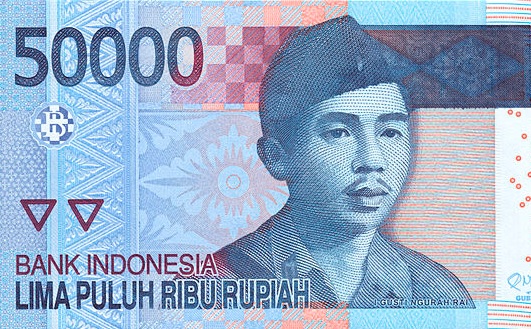Analysis Indonesian Rupiah; Factors that Influence the Rupiah
The Indonesian rupiah strengthened on Monday (16/02) as the country’s twin current account and trade balances improved, while the US dollar weakened on disappointing US retail sales and on optimism that Greece will remain a member of the Eurozone. Meanwhile, Indonesia's Finance Ministry held a successful auction today in which it sold IDR 12 trillion (USD $942 million) of conventional bonds. Based on the Bloomberg Dollar Index, Indonesia’s rupiah appreciated 0.35 percent to IDR 12,753 per US dollar based on Monday (16/02).

Late last week, the central bank of Indonesia (Bank Indonesia) reported that the country’s Balance of Payments (BOP) posted a USD $2.4 billion surplus in the fourth quarter of 2014, supported by a capital and financial account surplus of USD $7.8 billion, and which exceeded the current account deficit of USD $6.2 billion (2.81 percent of gross domestic product/GDP). Regarding full-year 2014, Indonesia’s current account deficit improved to USD $26.2 billion, equivalent to 2.95 percent of GDP, from a (revised) deficit of USD $29.1 billion (3.18 percent of GDP) in the preceding year. For investors it is important to see the current account balance improving.
Earlier today, Statistics Indonesia (BPS) announced that Indonesia posted a USD $710 million trade surplus in January 2015. Although the surplus is positive, the steep decline in imports (-15.6 percent y/y) and exports (-8.09 percent y/y) are worrisome as they signal continued weak global demand for Indonesian products (particularly commodities) as well as weakened domestic demand in Indonesia which may indicate slowing economic activity in Southeast Asia’s largest economy. Indonesian GDP growth slowed to a five-year low of 5.02 percent (y/y) in 2014.
On Monday (16/02), the Finance Ministry of Indonesia sold IDR 12 trillion ($942 million) of conventional bonds, in line with the indicative target, with total incoming bids at IDR 36.1 trillion (but lower than the IDR 40.2 trillion sold on 3 February). The highest bid-to-cover ratio at Monday’s bond auction was 4.51 for the one-year T-bills (having a weighted average yield of 6.24200 percent, higher than the 6.20538 percent in the previous auction). Solid demand signals that investors have confidence in Indonesia’s debt markets.
Regarding the ‘Greek default issue’ or ‘Grexit’, there emerged some optimism that the new leftist government of Greece and its creditors share a willingness to compromise before the expiry of Greece’s bailout package (at the end of February). However, there remain plenty of sceptics who believe a Greek exit from the euro is inevitable. Today, the finance ministers in the Eurozone meet again to discuss the issue.
Meanwhile, the US dollar weakened after the release of January’s US retail sales. Overall retail sales in the world’s largest economy fell 0.8 percent in January 2015, slipping for a second consecutive month, attributed to falling gasoline prices and slowing car sales. The disappointing retail sales signal that the US economy starts softer than expected at the start of 2015. It also causes expectation that the US Federal Reserve will not decide to hike its key interest rate soon and therefore investors’ appetite for lucrative (yet riskier) emerging market assets increases.
Bank Indonesia's benchmark rupiah rate (Jakarta Interbank Spot Dollar Rate, abbreviated JISDOR) appreciated 0.21 percent to IDR 12,742 per US dollar on Monday 16/02).
The market will also be interested to learn the outcome of Bank Indonesia’s Board of Governor’s Meeting which is scheduled for Tuesday (17/02). However, Bank Indonesia is not expected to alter its interest rate policy yet in spite of inflation having eased to 6.96 percent (y/y) in January 2015 from 8.36 percent (y/y) in the previous month. Currently, the central bank’s key interest rate (BI rate) stands at 7.75 percent. Although a lower BI rate would trigger accelerated economic growth (as domestic consumption increases), it would also imply more imports hence resulting in a widening current account deficit and thus placing additional pressure on the value of the rupiah.
Last week, Bank Indonesia Governor Agus Martowardojo said that the performance of the rupiah primarily depends on external factors, not so much on domestic factors. With the US economy in general showing structural improvement over the past year, investors are likely to start reducing investment portfolios in emerging markets soon. As such, Indonesia will see capital outflows ahead of the looming US interest rate hike which is expected to occur later this year.
Meanwhile, London-based financial company Barclays released a report last week in which it mentioned that the rupiah may decline to 13,250 per US dollar by the year-end (a level not seen since 1998 when the Asian Financial Crisis had rocked the country). In a move to limit capital outflows, Barclays believes that Bank Indonesia will raise its BI rate by 25 basis points to 8 percent later this year.
Indonesia’s benchmark stock index (Jakarta Composite Index) fell 0.91 percent to 5,325.50 points on Monday (16/02) due to profit-taking after the index had hit another record high on Friday (13/02).
–

